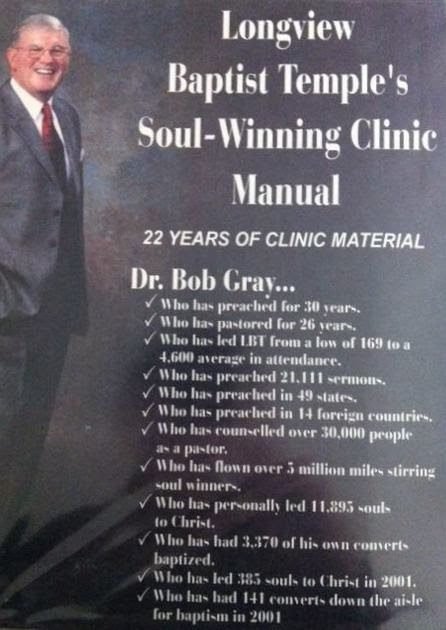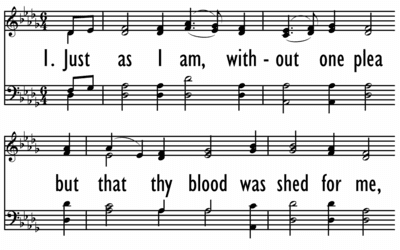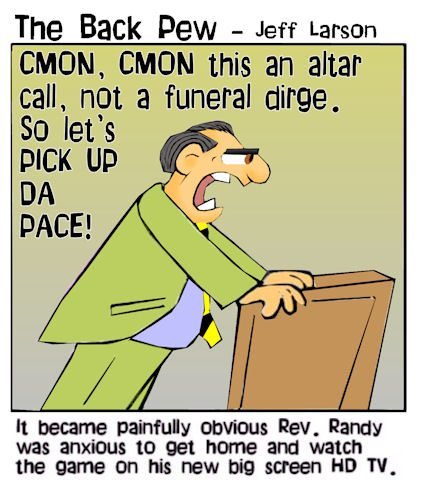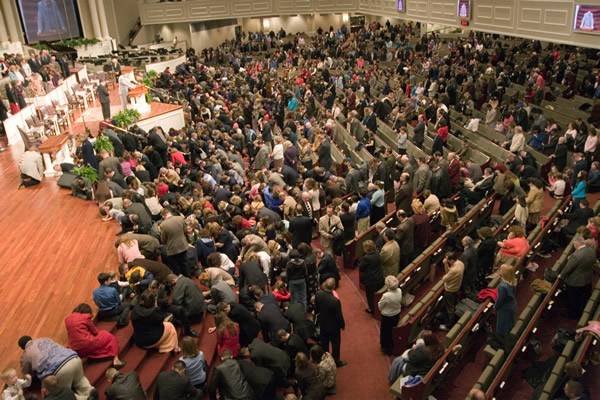
Every head bowed, every eye closed.
Is God is speaking to you right now?
What is it God wants you to do?
Do you need to be saved? Step out from where you are and come kneel at the altar. Cry out to God. He will save you. Don’t delay. Behold, NOW is the accepted time and NOW is the day of salvation.
Do you need to get right with God? Don’t delay. Don’t wait for another day. Step out from where you are, and come kneel at an old-fashioned altar and do business with God.
Whatever it is God wants you to do, do it today.
As we sing the first verse of Just As I Am, you come. Don’t wait. You don’t have the promise of tomorrow.
Come…
Over twenty-five years in the ministry, I gave countless public invitations like the one above. The emphasis might have differed from week to week, but the focus was always on NOW, doing what God wants you to do without delay.
Sometimes, I would tell a poignant illustration that I hoped would drive home the importance of making a decision. My philosophy was clear:
- There is a God
- The Bible is truth
- God hates sin
- Salvation is through the merit and work of Jesus Christ
- There is a Hell to shun and a Heaven to gain
- No one has the promise of tomorrow
- Death is certain
- Decisions affecting our eternal destiny should never be put off
The invitation was the point in the service where I (God) brought everything together. It was the climax, the point where God showed his mighty power by saving sinners and calling backsliders back to the faith.
Thousands of people responded to altar calls given by me. I was pretty good at it. I knew what to say, and how to say it. I could read the emotions of those under the sound of my voice, and with a few well-placed words, get them to walk the aisle. What I called conviction back then is what I now call guilt. The Bible is a world-class book for making people feel guilty. And when people feel guilty (under conviction) they are ripe for manipulation.
In one church I pastored for 11 years, we had over 600 public professions of faith. We baptized hundreds of people. Rare was the Sunday when no one came forward during the invitation. (For many years, I gave invitations every time we held a service.)
On those rare weeks when no one stepped out for Jesus, I was often quite depressed. I thought, why didn’t anyone come forward? Maybe my sermon was poorly constructed, or perhaps God was punishing me because of some unconfessed sin in my life? In other words, God might send someone to Hell to get my attention.
The number of people responding to the invitation, like the number of people attending the church, is a measure that pastors use to judge themselves successes or failures. Church members judge the success or failure of their pastor by whether God is using his preaching to save people and reclaim backsliders. They also judge him based on the numeric growth of the church. In many ways, the church is no different from the corporate world, where corporations are judged a success or a failure based on economic output (stock price, revenue increase, increased productivity, bottom line profit).
Every church I ever pastored grew numerically. I was good for business. I knew I had good preaching skills. I knew I had “people” skills, and I was effective in reaching people with the gospel. I expected results. I expected God to work. I expected people to walk the aisle and do business with God. My modality in the church was similar to the manner in which I conducted myself in the business world. Over the years, I managed restaurants for Arthur Teachers, Long John Silvers, and Charley’s Steakery (along with a number of other management-level jobs). As a general manager, I was driven to succeed. Success was measured by net profit (a secular version of souls saved and church attendance growth).
Toward the latter third of my time in the ministry, I came to see that the altar call was a tool used by pastors to manipulate emotions, give the illusion that God’s power was on them, and that God was using them. I have no doubt that many pastors believe their own hype; I know I did. I came to see myself as a man used greatly by God. The proof was in the numbers.
When I stopped giving altar calls, many people responded negatively, and a few people even left the church. In their minds, an old-fashioned, Bible-believing church has altar calls. People should have an opportunity to respond to the sermon. People should have an opportunity to respond to the Holy Ghost’s leading. One former friend, a pastor, told me that he would never attend a church that didn’t give an altar call. Never mind that there is not one instance of an altar call in the Bible. Never mind that the history of the altar call can be traced back to Pelagian Charles Finney. In his mind, a good church was a church that gave altar calls. A church without altar calls was a liberal church that didn’t love souls.
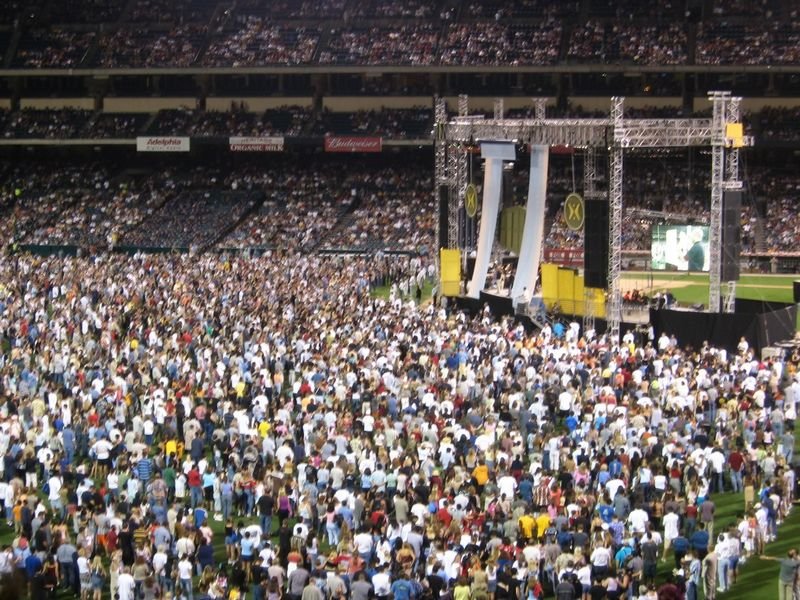
In the 1960s, evangelists such as Billy Graham popularized the altar call and brought it to the TV screen. Many of us remember seeing a Billy Graham Crusade on network TV. Who can forget the altar call, hundreds of people pouring out of the aisles making their way down to the front. What most people did not know is that MANY of the people responding to the invitation were actually Christian altar workers. They helped “prime the pump” with their movement forward, encouraging others to do the same. If you take the first step, God will help you take the rest . . .
When we are part of a group, there is pressure to conform to the group standard. This dynamic is quite evident in church. Individuality is discouraged. Dissent is frowned upon. I see the same problem in the secular world. Most human beings don’t want to stand out from the crowd, so they tend to embrace whatever the group standard is.
Personally, I try to fight such conformity. I will gladly sing the national anthem and recite most of the Pledge of Allegiance, but I’ll be damned if I will bow my head and take off my hat in an act of worship as some knucklehead prays for God to bless the race car drivers or a singer sings God Bless America during the seventh-inning stretch at a baseball game. That said, I have no doubt that I succumb to the group standard more than I care to admit.
Group conformity is not necessarily bad, but we must be careful we do not surrender our ability to reason and think for ourselves. The pressure to conform to a group standard in church often sucks the life, vitality, and joy from a person. When the pastor gives an invitation and scores of people respond, the pressure to do likewise is strong. Being right with God = walking the aisle. Standing in the pew and not walking the aisle = Not right with God.
Many years ago, I attended a Sword of the Lord Conference in the Canton, Ohio area. Curtis Hutson was one of the main speakers. He preached on the family, on fatherhood. At the close of his sermon, he gave an altar call that basically said “If you want to be a better father, you need to come to the altar and profess your willingness to do so.” Hundreds and hundreds of men responded. I didn’t. I thought Hutson was being quite manipulative, so I refused to walk the aisle. Of course, I stood out like a sore thumb. People thought, I am sure, Either that guy thinks he is a better Christian than the rest of us, or he refuses to get right with God. Who doesn’t want to be a better father? Never mind that one prayer at an altar does not a good father make.
Pastors well-schooled in their craft and blessed with the ability to effectively communicate, can, if they are not careful, manipulate people. The altar call is just one of many tools that can be used for manipulation. What pastors call God is actually the pastor and his well-honed communication skills manipulating those listening to his sermon.
A public church service can be a dangerous place. Parents, with nary a thought, allow their children to be influenced by experts in mental and emotional manipulation. Even adults, especially those who have “sin” problems in their lives, are susceptible to manipulation. Adults enter the church building burdened with the cares of life, and the pastor, with his well-chosen words, convinces them to respond to an altar call. Jesus is the answer! Hooked on drugs or booze? Jesus will set you free. Family a mess, headed for divorce court? Jesus will make things right. Come, don’t delay. And people, with lives burdened down by problems and adversity, rush to the altar thinking Jesus will fix everything for them. He doesn’t, and they are worse off than they were before. Why are they worse off? Because they will likely think or be told by the pastor that the lack of change is their fault. They didn’t pray hard enough, or perhaps they had some secret sin they were holding on to. God never gets the blame for failing to do what the pastor said he would do. It is ALWAYS the sinner’s fault, not God’s.
Let me ask you a question. Every head bowed, every eye closed.
Are you saved? Do you remember a definite time and place in your life where you repented of your sins and accepted Jesus Christ as your Lord and Savior?
If not, raise your hand. No one is looking. This is just between you and God. Raise your hand, I want to pray for you.
I see that hand. And that one. Thank you, Ma’am. Thank you, Sir.
Lord, you see the hands that were raised. Save them, Lord. In Jesus’ name, amen.
In a moment we are going to sing Just as I Am.
If you raised your hand, I want you to step out from your pew and come to the front. Someone will meet you and will share with you what the Bible says about being saved.
Don’t delay.
That’s right, keep coming.
Are there others?
Even if you didn’t raise your hand, is there something you need to confess to God?
Come.
Do it now.
Don’t wait.
Dinner will wait.
Your soul is worth more than all the money in the world.
We are going to sing the last verse one more time. That’s it. Don’t neglect so great a salvation.
God doesn’t promise to always strive with you. One day his Spirit may no longer call and it will be too late for you . . .
Come . . .
Bruce Gerencser, 68, lives in rural Northwest Ohio with his wife of 47 years. He and his wife have six grown children and sixteen grandchildren. Bruce pastored Evangelical churches for twenty-five years in Ohio, Texas, and Michigan. Bruce left the ministry in 2005, and in 2008 he left Christianity. Bruce is now a humanist and an atheist.
Your comments are welcome and appreciated. All first-time comments are moderated. Please read the commenting rules before commenting.
You can email Bruce via the Contact Form.




